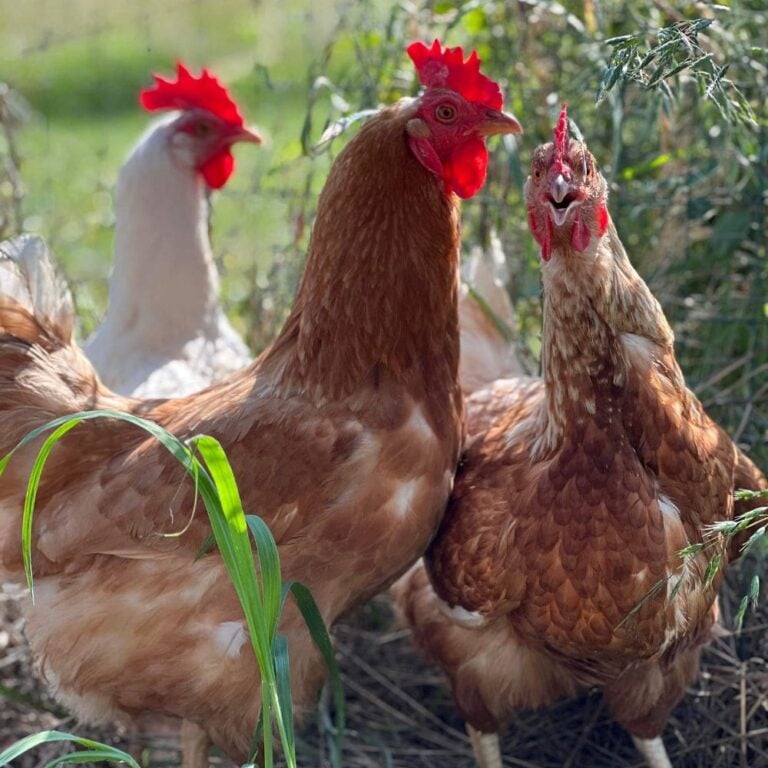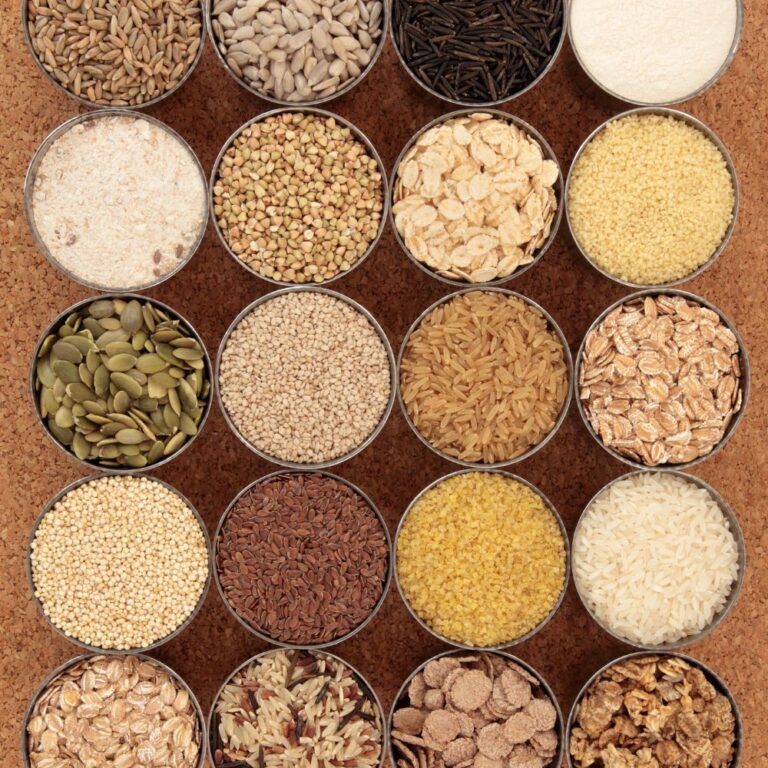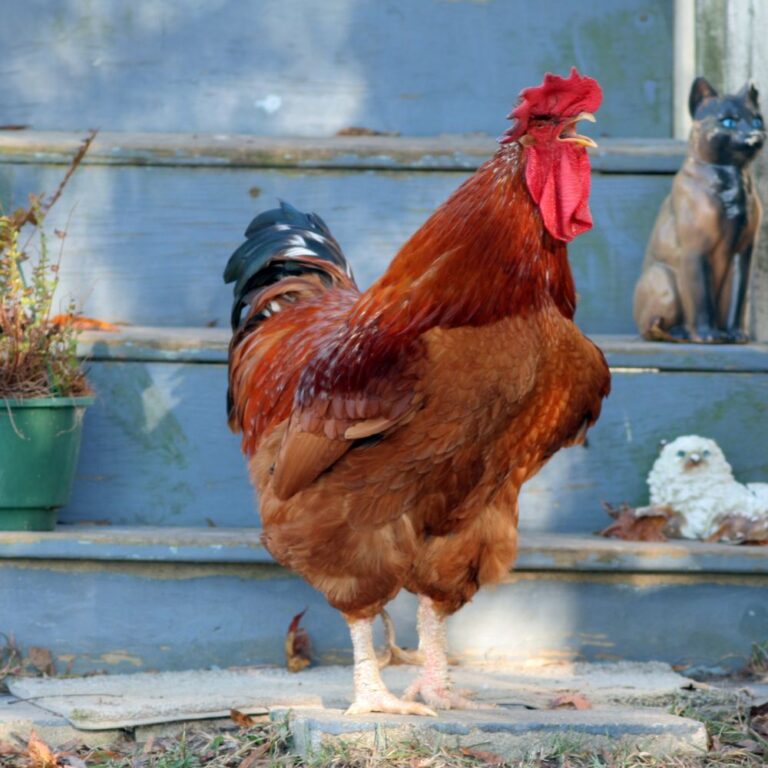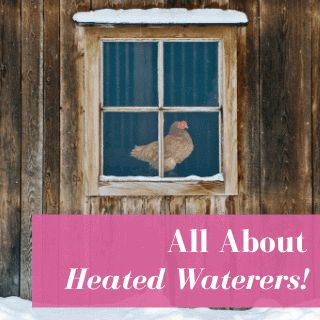We all know hens need water….but do you know what’s the best chicken waterer to make sure your fluffy butts are safe?
A good chicken waterer can make or break your flock. During the summer, it needs to provide consistent access to cool water to avoid heat stroke. In winter, it needs to be tough, so it doesn’t freeze over.
In this article, we’ll explore the various options available for chicks and adult hens. Chicken waterers are the easiest and best way to water chickens, regardless of season OR flock size.
Table of Contents (Quickly Jump To Information)
The best chicken waterer we recommend:
The best chicken waterer for summer:
The best chicken waterer for winter (to keep water from freezing):
Why do I need a chicken waterer?
In short, because chickens need consistent access to water. Without it, they’ll become dehydrated, sick, and eventually, they’ll die. Waterers also let you keep track of your flocks liquid intake. This is especially important on hot days, or if they seem sick or stop laying eggs.
And if you want to provide herbs to your flock, soaking the herbs in water makes it easier to ensure all your hens get the benefits.
Chicken water feeders, or drinkers, come in a variety of sizes and shapes – what’s most important is that the waterer is safe, can hold enough water to last your chickens all day, and that your flock can’t knock it over and dump the contents everywhere.
How many chicken waterers do I need?
It’s best to have 1 waterer for every 5 chickens, especially during the summer (very hot climates might want to have 2+ waterers per chicken, especially if you’ll be gone all day.) If you have less than 1 waterer per 5 chickens, you will probably have to fill it up more frequently. If you use a automatic chicken waterer system like nipples, you just need to make sure there’s enough water in the system for all your chickens.
Different Kinds of Chicken Waterers
There’s different options with waterers and chicken water drinkers, and it’s best to know all the available options so you can pick the right one for your flock. (You can also check out the best chicken feeders I recommend here.)
There’s several kinds of waterers:
- Mason jar waterers
- Plastic waterers
- Stainless steel waterers
- Nipple waterers
- Pet bowls
- Drinker cups
Mason jar waterers
These are perfect for chicks, and they’re relatively inexpensive. They’re not the best for adults, however, because they don’t typically hold enough water. You will have to clean them daily, otherwise mold and moisture build up on bottom of the waterer, and form a gnarly bacteria culture.
Plastic waterers
These are an affordable option, and they’re also easy to clean. Sometimes they hold enough water for chickens, especially if you have a flock of 1-5 chickens. They’re also good for bantam chicken flocks. For larger flocks, however, they typically don’t hold enough to last all day. Like the mason jar waterers, you need to clean these daily.
Stainless steel waterers
These tend to be bigger than plastic waterers, but the same issue applies. They’re usually not big enough to accommodate flocks of 10 or more chickens (although you can use more than one waterer). They’re also usually heavier, so they’re harder for hens to knock over (which is a good thing). This is one of the easiest to use for all chicken breeds.
Nipple waterers
These systems make watering chickens very easy, and it keeps the water cleaner than the options above. Typically, the water supply is housed in a barrel, and the water automatically fills the nipples. Your chickens can then get a drink whenever they want.
The downside is that:
- they’re sometimes hard to clean,
- don’t provide a lot of water at once,
- have a learning curve for your flock,
- and tend to be more expensive.
Pet bowls
Yep, you can use a large canine pet bowl for your chickens – they work great. They’re durable, easy to clean, and can hold a lot of water. There’s nothing that says you need to spend a lot! (You can learn about other costs of owning a chicken here.)
These are also great if you need cheap or DIY chicken feeder ideas.
One downside is that your chickens can easily tip them over (you can always place rocks in them), and the water can get dirty very easily.
Drinker cups
These are a type of automatic waterer that fills a drinking cup at eye level whenever your chickens are thirsty. They’re easy to set up and for chickens to learn to use. One downside is a lot of them aren’t very deep (so your chickens won’t get a lot of water per swallow) and they can freeze during winter.
How Much Water Does A Chicken Drink?
On average, chickens drink about a quart of water daily – so your waterers should be able to hold enough to keep each member of your flock happy. Using an automatic chicken waterer is the easiest way to make sure your flock has enough to drink. If your chickens become dehydrated, they can become sick or they might not lay eggs as efficiently.
What Should A Chicken Waterer Be Made Of?
Your chicken waterer can be made of several different materials:
- Plastic,
- Rubber, and/or
- Stainless steel
There’s advantages and disadvantages to each option.
What’s better, plastic, rubber, or stainless steel?
On a grand scale, all are equally just as good – so when deciding on the best chicken waterer for your flock, choose the material that works best for your situation.
Plastic is always going to be easier to clean, especially in crevices. Rubber tends to shred, or get marks on it where bacteria can hide. It’s important to note, however, that plastic is less durable, and more likely to be cracked than rubber or stainless steel.
However, in winter, rubber tends to freeze less than plastic or metal. With a stainless steel chicken waterer, it’s important to take note that in the winter it can freeze faster, so if you don’t use a water heater, plastic or rubber is the better choice to go with.
With rubber heater buckets they tend to be black, this is so they’ll attract heat, and make the frozen water melt faster. (You can learn more about how to keep chicken water from freezing here.)
These are a type of solar heated chicken waterer – so using a rubber ground feeder, you can make your own diy heated chicken waterer. Amazon has good options, and there are many tutorials and resource material available on the internet to make a chicken waterer diy.
Watch this video for more information:
Do Chickens Need An Automatic Waterer?
Your flock doesn’t necessarily need an automatic waterer, but it can make it easier to ensure that your chickens have access to water all the time. This is especially during the summer, when heat stroke can take its toll (learn more about how to keep chickens cool here).
On average, a mature chicken can drink approximately 1 quart of water each day in temperatures from 40 – 75, and even more in hot weather. They’ll also tend to drink more in winter, when the air is drier, so if you live in an area with long winters, consider investing in a 1 gallon heated chicken waterer.
In the winter, if you have an automatic waterer make sure that it will work in sub-freezing temperatures.
This is the automatic waterer we recommend:
What Size Chicken Waterer Is Best?
For adult chickens, it’s best to get 1 waterer per 5-6 chickens, and possibly more if you have flock bullies. Especially during summer, it’s important to make sure everyone can access water. You’ll need a waterer that holds about 1-2 gallons, if you have a flock of 5-6 chickens.
For day old chicks, a mason waterer is best. It holds enough water, and is shallow enough so your chicks won’t drown.
If you have adult chickens or chickens over 16 weeks, a 5-gallon bucket waterer is perfect – just make sure to turn it into an automatic waterer like in this video. While it’s tempting to just put the 5 gallon bucket in the coop, it’s too deep, and your chickens might fall in and drown.
Should I Use A Nipple System For My Chickens?
Many people are happy with a chicken water feeder that includes nipples. They do have to be set up, but are handy devices designed to give water to chickens with minimal mess. Make sure your flock can get enough water, and also remember to hang it just a few inches above ground so your chickens can reach it. To hang it, use a stud or 2×4 board, since the waterer tends to be heavy..
In winter, these aren’t the best choice because they’re typically made with metal, which can freeze easily.
Should I Use Drinker Cups?
Using drinker cups might be the best chicken waterer system for your flock since it’s an easy and affordable automatic system. Remember to check the depth of the cups – in some cases, they aren’t deep enough for an adult chicken to get enough water. These are great for chicks, though, because they prevent the baby chicks from falling into the water and drowning.
Also, make sure any pipes in the drinker cup system are easy to clean or replace when they’re dirty. It’s important to prevent bacteria from forming and harming your flock.
Should I Use A Water Heater In Winter?
You can use a heated chicken waterer, just make sure it’s safe and won’t cause a fire. In Southern areas of the USA, it’s not really necessary as long as temperatures don’t get below freezing (especially during the day). Plastic or rubber are also the least likely to freeze. (You can learn how to keep water from freezing with this trick – it also works for heated duck waterers too).
In some areas of the US, you likely will have to use a water heater, especially if temps in your area are consistently under 32 degrees F. Insulated chicken waterers are another option, however, even they will freeze eventually.
If you do use a water heater, it’s best to not use an extension cord because this can spark a fire. Always plug directly into a socket, and frequently check the cord to make sure it’s in good condition.
Where Can I Buy Chicken Waterers:
- Your local farm store
- Tractor Supply
- Orschelins (in the Midwest)
- Amazon
- True Value (nationwide locations)
- Royal Rooster (ships in USA and Australia)
- Duncan’s Poultry
The Top Waterers On Amazon
Harris Farms Plastic Poultry Drinker 3.5 Gallon
This Harris Farms chicken waterer has the capacity to hold a 3.5 gallon of water, it’s durable and easy to fill with a twist-lock system that comes with a hanger/carry handle.
LITTLE GIANT Automatic Waterer, 5 Quart
Created by Little Giant, this easy to assemble and clean automatic waterer can hold up to 5 quarts of water providing a continuous flow of fresh water for adult poultry. The automatic float controls the water level to ensure that there is no spilling or overflow. The cover prevents roosting and keeps debris out of the water and it has a 0.75-inch hose that attaches to a standard garden hose.
Miller Manufacturing 740 Mason Jar Water Base
Designed by Miller Manufacturing, this plastic base waterer is perfect for poultry and game birds. It’s molded from shock resistant polystyrene and fits a model 690.
5 Gallon Chicken Waterer – Horizontal Side Mount Poultry Nipples
Created by RentACoop, this chicken waterer has the capacity to hold 5 gallons and is made from 100% food grade and BPA free plastic. The horizontal nipples prevent the ground/bedding from getting wet and comes with a no-roost cone to keep the lid clean and bacteria free. It comes in complete setup no assembly required!
RentACoop Automatic Chicken Water Nipple Cup Waterer Kit for Poultry
Created by RentACoop, this automatic chicken waterer doesn’t need tabs to push and the cups are always half full! It’s a solution for clean water for ducks, geese, turkeys, and an innovative chicken water drinker. Watch this video to see how it works:
Royal Rooster Chicken Poultry Twin Waterer with Automatic Valve Operated Cup
Designed by Royal Rooster, this twin waterer is a no-mess solution to water your chickens or ducks! It’s easy to fill and clean and hooks straight onto mesh or attach to the wall with brackets. It has the capacity of 1-gallon cup style drinker (suits 4-6 chickens/ducks), 20” tall, UV stable, durable PVC plastic, Australian made quality.
Premier Chick Nipple Waterer
Created by Premier, this nipple waterers has a 1-liter capacity that sits or hangs above the litter so water is always clean. It’s ideal for easy clean-up and a no-mess solution to giving waterers to chickens.
Farm Innovators Model HPF-100 “All-Seasons” Heated Plastic Poultry Fountain, 3 Gallon
Designed by Farm Innovators, this is by customer demand one of the best chicken waterer on Amazon. It’s a premier one chicken waterer that has the capacity to hold 3 gallons and it prevents water from freezing down to 0-degree F due to it being thermostatically controlled. It’s an all-around heated duck waterer and one of the most well reviewed heated chicken waterer Amazon has.
Premier Chick Nipple Drinker with Wall Bracket
Created by Premier, this 1-liter nipple drinker can sit or hang above the litter to ensure that water is clean and fresh, comes with a wall bracket for hanging on a brooder or coop wall. The lightweight wire hanging bracket is also included with the nipple waterer for attachment to the cage.
Muddy Hill Farm Sideways Sipper Horizontal Drinker Nipple – Spring Action, No drip, Side Mount, Poultry Nipple Drinker
Designed by Muddy Hill Farm, this sipper uses a horizontal drinking nipple to ensure no drips and leaks, unlike vertical nipples. Easy to install with its unique wing-like shape, just drill a ⅜” hole in your plastic container and screw in the Sideways Sipper Horizontal Poultry Drinker Nipple.
How To Clean A Waterer
How Do You Clean A Chicken Waterer?
To clean a chicken waterer:
- Soak the entire waterer in hot water
- With a stiff cleaning brush, gently scrub away dirt and bacteria.
- You can also use a gentle soap (make sure you get all the soap out of the waterer after scrubbing).
- If you don’t want to use soap, you can use hot water and white vinegar instead.
- Make sure all residue is cleaned off the waterer before returning it to your chicken coop.
It is important to clean your chicken water dispenser often. because nasties like bacteria, dirt, or algae can contaminate your flock’s water. In some cases (like stainless steel or nipples), you might also notice rust buildup on your waterer. Clean your vessel monthly with a brush, hot water, and a gentle dish soap. If you do not want to use soap, you can use white vinegar instead (we use this when cleaning our chicken incubators to get rid of bacteria.)
Is Bleach Harmful To Chickens?
In large quantities, it’s poisonous. Because chickens are so much smaller than humans, they feel the effects of bleach fumes more than we do. When cleaning your chicken waterers, it’s best to steer clear of bleach and use milder options.
How Much Vinegar Do You Put In Chicken Water?
If you want to clean your waterer with vinegar, use 1 tablespoon per 1 gallon of water. Be sure to clean your waterers with hot water, and use a stiff brush to scrape away dirt and buildup. If you want to give your chickens apple cider vinegar in their water, add 1 tablespoon of vinegar per 1 gallon of water, and add the mixture to their water dispenser.
How Do I Keep Algae Out Of My Chicken Waterer?
To keep algae out of chicken water:
- Keep your waterers out of the sun
- Clean them frequently
- Use a fountain, or other waterer that’ll keep water moving
Algae grows in standing water that’s in sunlight. So, to keep your flock’s water algae-free, make sure to keep their waterer out of direct sunlight, and clean them frequently. Since algae grows in standing water, you can also use a fountain since the moving water makes it harder for algae to grow.
Can Chickens Drink Water Out Of A Bowl?
Yes – large canine bowls (for great danes or irish wolfhounds, for example) are best. You can use just about anything that can hold liquid to give water to your chickens. Some common devices to keep hens from flipping over their water bowl are halves of tires, tip-over pails, rocks, and tubs.
Can Chickens Drink Cold Water?
Yes. Chickens like drinking nice cool water. During summer months, you can provide cool water for most of the day by putting a block of ice in their waterer in the morning. Even in the winter, chickens will prefer cool water over hot.
Do Chickens Need Lots Of Water?
The average chicken drinks about 1 quart of water a day. So, you will need to provide enough water to satisfy your entire flock. You’ll also need to check their water intake in winter to make sure they’re drinking enough – otherwise, they might become dehydrated.
How Much Water Do Chickens Need A Day?
A typical full-grown laying hen will on average need a quart of water on a daily basis, however, this varies on the size of the hen, seasons, and outdoor temperature. Do not limit a chicken’s water because having an inconsistent supply of water will stop them from laying eggs and their health will deteriorate.
Do Chickens Need Water Inside Their Coop?
Yes, especially if they stay in a coop and/or run full time. Even though chickens don’t drink once they roost, they’ll be up at the crack of dawn (since chickens see more colors than we do, they’re up earlier). They’ll want a drink as soon as they wake up and start moving. During summer, they might return to their coop because it’s shady. In winter, they might not want to leave to stay warm. So, it’s always a good idea to keep water in your chicken coop. You can learn about what your coop should include here.
Do Free Range Chickens Need Water?
Free range chickens are no exceptions – they still need an adequate amount of water for them to remain healthy. They need a clean, fresh water source in the garden or access to their waterer located in the chicken coop.
Can Chickens Go Without Water At Night?
Yes, because once night falls and they roost, chickens usually won’t want to eat or drink. However, it’s still a good idea to keep water in their coop. Once they wake up and start moving, they will want water.
How Long Can Chickens Be Without Water?
Chickens can be without water for a couple days, but it’s not recommended. To remain healthy and to lay eggs, chickens need full time access to water. Without it, they can become dehydrated and stop laying eggs. It can take several weeks for them to recover.
Will Chickens Drink Dirty Water?
Yes, they will. Chickens aren’t too picky. However, it’s not a good idea to give them dirty water. It can contain harmful bacteria or mold, or any other thing that can make your flock sick. It’s best to provide fresh, clean water at all times.
Will Antifreeze Kill Chickens?
Yes, antifreeze is poisonous to chickens. Antifreeze contains ethylene glycol, which is highly toxic – it can take just a few drops to kill a chicken. It’s always best to keep your antifreeze away from your chickens (and other household pets).
Can I Put Apple Cider Vinegar In My Chickens Water?
Yes, chickens love apple cider vinegar, and it’s easiest to offer it to your flock in water. Mix 1 tablespoon of apple cider vinegar per 1 gallon of water. You can learn more about apple cider vinegar and chickens here.
Which do you think is the best chicken waterer? Leave a comment below!
Maat van Uitert is a backyard chicken and sustainable living expert. She is also the author of Chickens: Naturally Raising A Sustainable Flock, which was a best seller in it’s Amazon category. Maat has been featured on NBC, CBS, AOL Finance, Community Chickens, the Huffington Post, Chickens magazine, Backyard Poultry, and Countryside Magazine. She lives on her farm in Southeast Missouri with her husband, two children, and about a million chickens and ducks. You can follow Maat on Facebook here and Instagram here.






